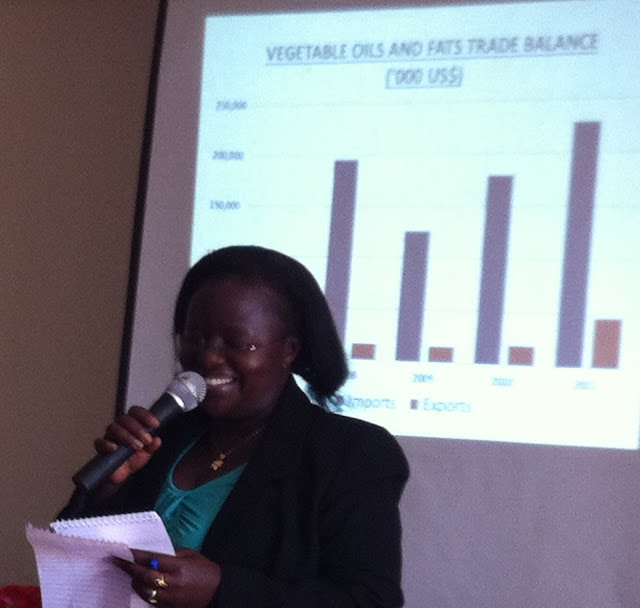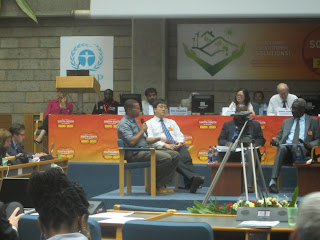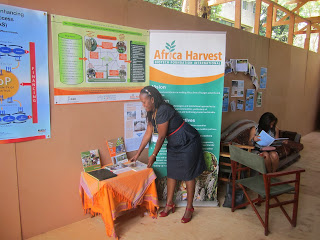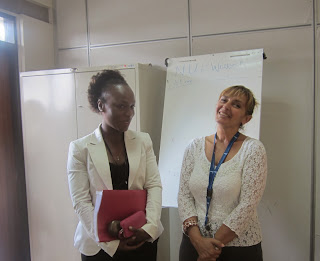![]() |
| Scribe's wall from the morning session of IFAD's first FAILfaire. ©IFAD |
“Failure is not an option.” The traditional viewpoint of many a hard-driving manager is embodied in that pep-talk cliché. But an event held yesterday at the Rome headquarters of the International Fund for Agricultural Development turned the cliché on its head. Throughout the day, a series of guest speakers well versed in global development and social science made the case for a more accurate truism that could be summed up as follows: “Without intelligent failure, success is not an option.”
Known as a
FAILfaire– IFAD’s first – the event reflected a growing awareness in the international development sector that failure is a natural part of doing business. While some of the leaders in this field accept the importance of learning from failures, it seems fair to say that the corporate cultures of most development organizations are still not open to the free and unfettered sharing of such experiences.
Every speaker at the IFAD forum yesterday talked about the challenge of opening up a dialogue on failure. The three guests who brought their expertise to bear in the morning session were especially focused on this question. How, they asked, can we establish a safe space for honest conversations about incremental failures on the road to long-term, sustainable success in reducing poverty and ensuring food security?
Obstacles to innovationJournalist and economist
Tim Harford, the author of
Adapt: Why Success Always Starts with Failure and
The Undercover Economist, kicked off the session by explaining why learning from failure is so difficult. He identified four main obstacles to what he termed “productive failure” – including conformity, inadequate attention to feedback, the problem of risk, and basic human psychology.
![]() |
| Tim Harford explains 'productive failure'. ©Barbara Gravelli |
“Conformity is an obstacle to innovation,” Harford said, citing research (some of it
humorous) that shows how people tend to mistrust their own instincts unless others challenge the conventional wisdom first. A diversity of viewpoints is therefore essential “to break the spell of conformity,” he added.
Harford went on to say that unless the managers of any project or initiative seek out timely feedback from the ground level, they will remain unaware of small, correctable problems until they become bigger, intractable ones. And while some enterprises, such as nuclear power plants, do well to avoid innovations that might fail, Harford asserted that the risks of innovating are usually not as great as people fear. In general, these risks can be managed with a modicum of foresight and planning, he said.
As for the pesky variable of human behaviour, Harford highlighted our common tendency to compound our failures because we avoid acknowledging them in the first place.
Overcoming the fear of failureAshley Good, founder and CEO of FailForward – a Canadian non-profit that helps organizations become more failure-friendly – echoed Harford’s arguments, reiterating the point that fear inhibits innovation, adaptation and growth. “We have an instinctive fear of failure,” Good said, since the term has multiple negative associations that are absorbed from an early age.
![]() |
| Ashley Good discusses 'failing forward'. ©Barbara Gravelli |
Still, in a world marked by rapid change, it’s more important than ever to adopt flexible approaches to some of our greatest challenges. That won’t happen, Good suggested, unless organizations begin to speak openly about failures and “fail intelligently” in pursuit of workable solutions. In order to do so, she said, they must develop and implement robust strategies for using failure as a learning tool. Without sacrificing accountability, they also need to continually assess and adapt the ways in which they maintain a dialogue on failure.
Above all, they cannot afford to shoot the messenger. “It takes a great amount of courage to speak truth to power. It isn’t always going to be good news,” Good said. “But failure conversations must be truly blameless.”
Failing faster and smarterGood and the other speakers were quick to say that their goal was not to celebrate failure but, instead, to acknowledge that it is an inevitable part of any project and respond to it accordingly. Unfortunately, this is not yet the norm for most development organizations, said
Aleem Walji, who directs the World Bank Innovation Labs and previously served as Head of Global Development Initiatives at Google.
![]() |
Aleem Walji addresses the urgency of
sharing failures. ©Barbara Gravelli |
Most of the world’s poorest people live in fragile and unpredictable environments, Walji observed. Yet too often, institutions that are in the business of ending poverty focus on formulaic technical solutions that are not steeped in local complexities. To succeed, he said, these institutions have to be willing to begin with a hypothesis rather than a rigid technical fix – and then they must be willing to listen to the people who are directly affected by the project, identify failures early on, and change course quickly to correct them.
“The greatest risk we run is getting really good at doing the wrong thing,” he said.
In the long run, Walji concluded, it is far more responsible to “fail early, fail faster and fail forward” than to stick with preconceived ideas about what constitutes success. Otherwise, he said, “we’ll come up with the same answers as we have in the past, and we can’t continue doing business as usual.”
* * *
Dave Snowden, a leader in the field of knowledge management, spoke during the afternoon session of the IFAD FAILfaire. His remarks on the role of storytelling as a means of sharing and learning from failures will be the subject of a separate blogpost.

































